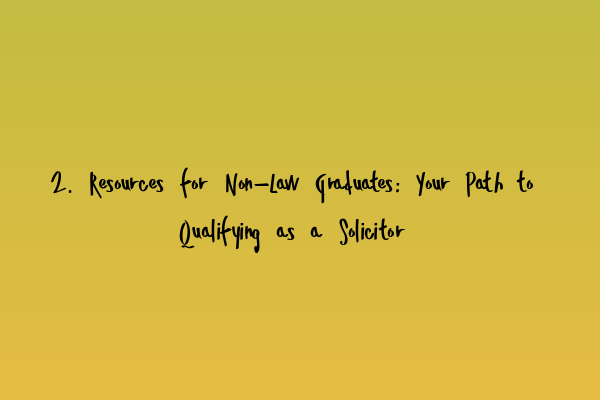Resources for Non-Law Graduates: Your Path to Qualifying as a Solicitor
If you’re a non-law graduate interested in pursuing a career as a solicitor, you might be wondering what resources are available to help you on your path to qualification. The process can seem daunting, but with the right tools and support, you can successfully navigate the Solicitors Qualifying Examination (SQE) and become a qualified solicitor. In this article, we’ll explore some valuable resources that can aid you in your journey.
1. SQE Training Providers
One of the first steps to consider is enrolling in an SQE training program. These programs are specifically designed to prepare you for the SQE exams, covering the necessary legal knowledge and skills required to become a solicitor. Look for reputable training providers that offer comprehensive courses tailored for non-law graduates.
Consider checking out leading SQE training providers such as SQE Exam Law, who offer comprehensive study materials, practice exams, and mock tests to help you gain confidence and familiarity with the exam format. Their courses are designed to cater specifically to non-law graduates, ensuring you receive the support you need to succeed.
For further insights on how to tackle multiple-choice questions in the SQE, read our related article: Strategies to Tackle SQE MCQs: Mastering Multiple-Choice Questions.
2. Online Study Materials and Resources
In addition to formal training programs, there is a wide range of online study materials and resources available to help you prepare for the SQE exams. These resources include textbooks, study guides, online lectures, and practice questions.
Consider exploring the SQE Exam Law website, where you can find valuable articles and resources to enhance your understanding of the exam pattern and topics. Their articles cover a range of topics, including scenario-based questions, demystifying the SQE exam pattern, and proven strategies to ace the SQE exams.
For further insights on how to approach scenario-based questions in SQE2, read our related article: Scenario-Based Questions in SQE2: Become a Master Problem-Solver.
3. Legal Research and Writing Skills
As a solicitor, strong legal research and writing skills are essential. It’s crucial to develop these skills during your preparation for the SQE exams. Consider using resources and tools that focus on legal research techniques and effective legal writing.
Additionally, SQE Exam Law offers articles and resources to help you develop and enhance your legal research and writing skills. These resources can provide you with insights on how to approach case studies and apply your knowledge in real-life scenarios.
For further insights on how to enhance your legal research and writing skills, read our related article: SQE Case Studies: Applying Knowledge in Real-Life Scenarios.
4. Networking and Mentoring
Connecting with professionals in the legal field can be invaluable for non-law graduates aspiring to become solicitors. Consider joining legal societies, attending networking events, and seeking out mentors who can provide guidance and support throughout your journey.
Be proactive in reaching out to legal professionals, whether that be through LinkedIn, legal forums, or local networking events. Building relationships and seeking mentorship can help you gain insights into the profession and provide valuable advice on navigating the SQE exams and the legal industry as a whole.
For further insights on proven strategies to ace the SQE exams, read our related article: SQE Strategies: Proven Tactics to Ace the Solicitors Qualifying Examination.
Conclusion
While the path to qualifying as a solicitor for non-law graduates may seem challenging, there are numerous resources available to support you along the way. Consider enrolling in an SQE training program, exploring online study materials and resources, focusing on developing legal research and writing skills, and connecting with professionals in the legal field through networking and mentorship.
Remember, with dedication, perseverance, and the right resources, you can successfully navigate the SQE exams and achieve your goal of becoming a qualified solicitor.
